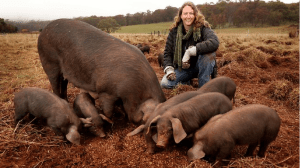Republished from Foodtank – original article here – Interview with Dr. Nick Rose, Australian Food System Activist – Food Tank
Food Tank recently had the opportunity to interview Dr. Nick Rose, Executive Director at Sustain, about the health of Australia’s food system and his view on what are the key factors impacting on a healthy and resilient food system in Australia.
Food Tank (FT): What are some of the biggest opportunities to support Australia’s food system?
Nick Rose (NR): The single biggest opportunity lies in the field of education, with the introduction for 2017 of a paddock-to-plate food literacy curriculum, Food Studies, as an elective for all Grade 11 and 12 students in Victoria, Australia’s second-most populous state. As a result, in a few years, as many as 10,000 students could be taking Food Studies. These students will form a growing cohort of capable tertiary graduates who can inform and lead the development of good food policy at the local, state and federal government levels. If other states follow Victoria’s lead and introduce a Food Studies curriculum, the wave of food systems change generated by tens of thousands of highly informed and motivated youth will, I think, be irresistible.
Other significant opportunities include the embrace and resourcing of sustainable and regenerative forms of food production, as well as the expansion of new and fair distribution systems and enterprises, such as farmers markets and food hubs. Legislative and planning protections for Australia’s major food bowl areas close to capital cities are sorely needed. Governments at all levels have a crucial role to play in these and other necessary shifts.
FT: With increasing innovation in the food system and networking technologies, what are you most excited about?
NR: I’m excited about creating a dynamic, multi-layered, and searchable food systems directory that will, for the first time, reveal the scale and breadth of Australia’s growing food systems movement. The development of this directory is a project that Sustain is now working on, with the support of the Myer Foundation, and we’re looking forward to making it a reality in 2017.
FT: From your extensive travels, what are some successful innovations in other countries that could be applied in Australia to improve the food system?
NR: I have a strong personal interest in the great potential of urban agriculture to transform the food system as a whole, and I saw dozens of examples of innovations on my Churchill Fellowship visiting the mid-west United States, Toronto, and Argentina in July–September 2014. Those innovations include: community urban land trusts to make city and peri-urban land available for sustainable and intensive food production, education, and social justice; capturing large organic waste streams to support sustainable and highly productive urban agricultural systems; planning overlays and zoning to facilitate commercial-scale urban agriculture production; the multiplication of inner-city farmers markets with dedicated space for urban farmers; the establishment of small-scale artisanal food processing facilities to incubate food entrepreneurs; the facilitation of city-wide urban agricultural networks; and, the development of comprehensive and inclusive urban agricultural strategies that recognize, value, and support the work of urban farmers and the organizations they are embedded in.
FT: How do organizations and individuals get involved in supporting a healthy and resilient food system in Australia?
NR: There are so many points of entry for individuals, from growing some herbs and vegetables, to supporting a kitchen garden at your local school (as a parent) and, or, your local community garden (more than 500 across Australia). Also, shopping at your local farmers market (now more than 180 in Australia) and, or, fair food enterprise, supporting local and sustainable producers wherever possible. Major change is needed at the level of policy, legislation and regulation, and here organizations can make a difference by joining one of the many local and regional food alliances that are in existence around Australia, or forming one if it doesn’t already exist in your region.
FT: If you could change one thing in Australia to improve its food system, what would it be?
NR: The single biggest obstacle in my view is the concentration of economic and political power represented by the supermarket duopoly—Coles and Woolworths. In the past 40 years, the grocery market share of these two companies has more than doubled to 75 percent. Meanwhile, Australia has lost more than 40 percent of its farmers, with the average age of farmers now approaching 60 years, compared to 42 years for the workforce as a whole. These two trends are deeply connected. As a country, we need to confront our tolerance for oligopolistic concentrations of political-economic power, and the supermarkets present the most urgent task, regarding the long-term sustainability and fairness of our food system.
FT: What personally drives your work to improve Australia’s food system?
NR: My drive stems from years living in Guatemala (2000–2006). It was here my political consciousness was awakened on realizing that the deaths of 200,000 Guatemalans, mostly Mayan indigenous peoples, could be traced to the refusal by the United Fruit Corporation and the then U.S. government of President Eisenhower to countenance even the partial redistribution of its massive landholdings and excessive wealth. This story is all documented in Bitter Fruit: The Untold Story of the CIA in Guatemala. It was a book that changed my life.
I believe that in working to improve Australia’s food system, I am part of a huge and growing global movement to transform the world’s food system. I dedicate my efforts to the memory of those who died in the struggle for a fair Guatemala.
































